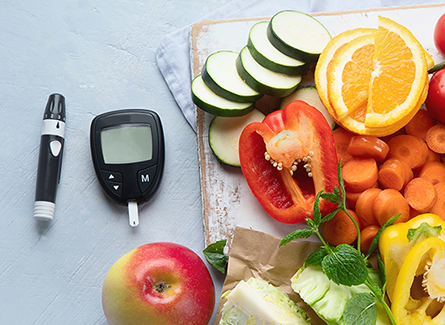
What is glucose? Based on an ancient Greek word meaning “sweet, delightful wine,” glucose is a form of sugar and the body’s main energy source. That’s especially true for the brain and its “sweet tooth” for glucose.
Carbohydrate Connection
Nutrition Counseling
Healthy eating and proper nutrition play a big part in maintaining good health. Our registered dietitians work with you to set realistic and achievable goals.
Your body breaks down carbohydrates into glucose, which your brain efficiently uses as a source of fuel for learning, remembering information and thinking. So demanding of glucose-derived energy, the adult brain consumes nearly 25% of the body’s glucose.
As the primary source of energy for our brain and nervous system, carbohydrates are essential to the body. However, not all carbohydrates are created equal. There are two types of carbohydrates:
- Complex carbohydrates are more nutritious for the body because they supply more fiber, minerals and vitamins. Complex carbohydrates aid in weight loss, balance blood sugars, help you feel fuller longer and lower cholesterol levels. They include:
- Beans
- Fruits
- Legumes
- Starchy vegetates (corn, peas and potatoes)
- Whole grains
- Simple carbohydrates are less nutritious for the body. More processed, they have less fiber, minerals and vitamins. In excessive amounts, simple carbohydrates can cause inflammation, raise cholesterol levels and spike blood sugars. However, all carbohydrates can be part of a balanced diet. The key is moderation through balanced meals and snacks. Simple carbohydrates include:
- Candy
- Juice
- Sugar
- White/refined grains
Natural Versus Added Sugar
You may have heard the terms “natural sugar” and “added sugar,” so what is the difference and what do they mean?
- Natural sugars include sugars naturally present in many nutritious food and beverages such as fruits and milk.
- Added sugars include sugars added during the processing of foods. This is the type of sugar we want to limit. Added sugar examples include brown and raw sugars, corn syrup, honey, maple syrup, molasses, and a list of “ose” ingredients from dextrose, fructose and glucose to high-fructose corn syrup, lactose and sucrose.
Next Steps
Healthy eating and proper nutrition play a big part in maintaining good health. If you would benefit from working with a registered dietitian nutritionist, talk to your primary care doctor for a referral to nutrition counseling at North Kansas City Hospital. Visit nkch.org/Nutrition to learn more about our nutrition services.
Know the American Heart Association’s recommendations for daily intake of added sugars for adults:
- Men: No more than 9 tsp or 36 grams
- Women: No more than 6 tsp or 25 grams



